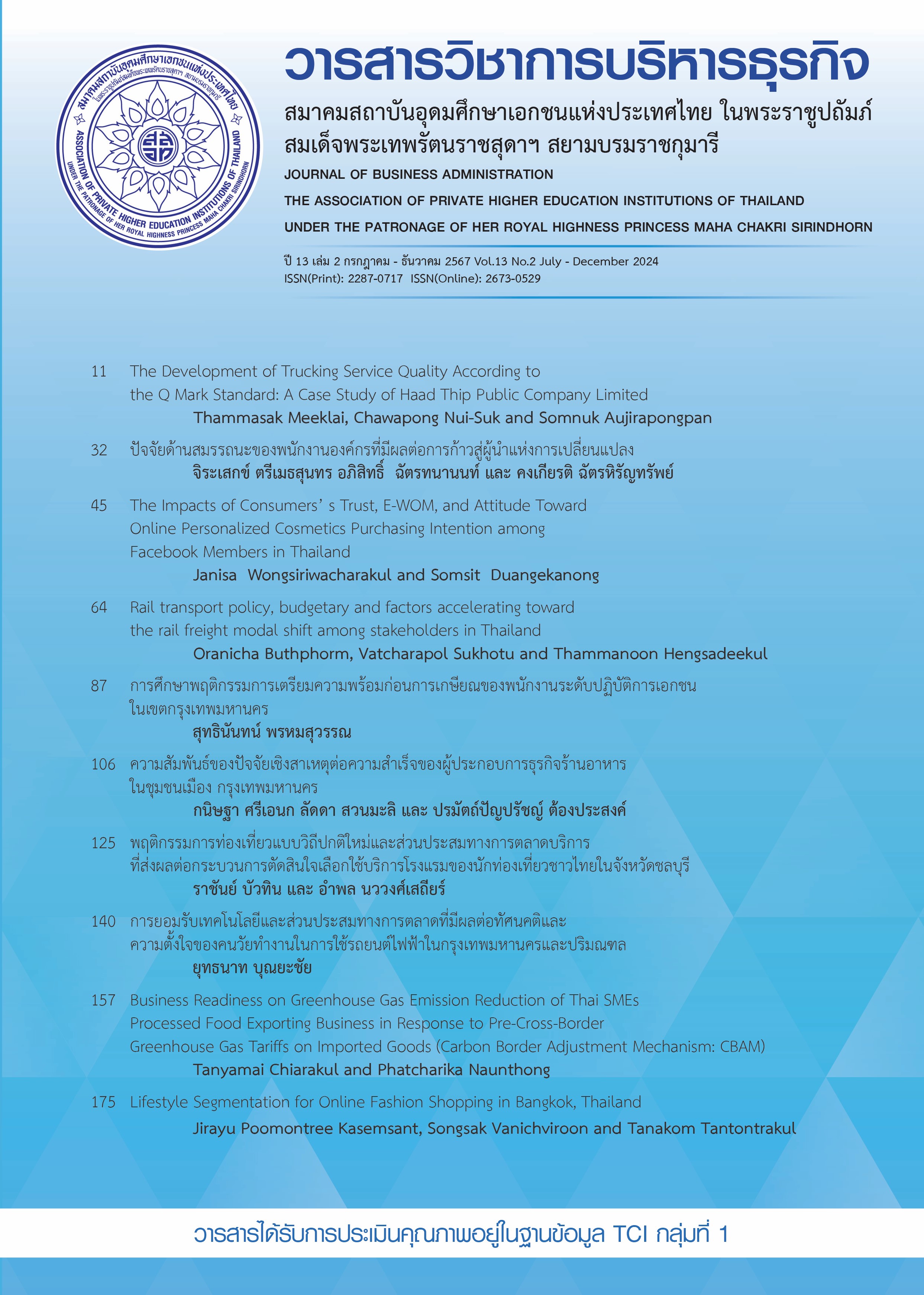ปัจจัยด้านสมรรถนะของพนักงานองค์กรที่มีผลต่อการก้าวสู่ผู้นำแห่งการเปลี่ยนแปลง
คำสำคัญ:
สมรรถนะ , พนักงานองค์การ , ลักษณะผู้นำแห่งการเปลี่ยนแปลงบทคัดย่อ
การศึกษาปัจจัยด้านสมรรถนะของพนักงานองค์กรที่มีผลต่อการก้าวสู่ผู้นำแห่งการเปลี่ยนแปลงมีวัตถุประสงค์ 1. เพื่อศึกษาระดับความคิดเห็นต่อลักษณะผู้นำแห่งการเปลี่ยนแปลง 2. เพื่อศึกษาระดับสมรรถนะของพนักงานองค์กร และ 3. เพื่อศึกษาปัจจัยสมรรถนะของพนักงานองค์กรที่มีผลต่อการเป็นผู้นำแห่งการเปลี่ยนแปลงประช่ากร และกลุ่มตัวอย่าง
ที่ใช้ในการวิจัย ครั้งนี้ ได้แก่ พนักงานองค์กรในเขตกรุงเทพและปริมณฑล จำนวน 385 คน ใช้ วิธีการเลือกตัวอย่างแบบเฉพาะเจาะจง
ใช้แบบสอบถามเป็นเครื่องมือในการวิจัย ประกอบด้วย 2 ส่วน ประกอบด้วย ข้อมูลเกี่ยวกับลักษณะของผู้นำที่มีความสำคัญต่อการเปลี่ยนแปลง และข้อมูลเกี่ยวกับปัจจัยด้านสมรรถนะของพนักงานองค์กรที่มีผลต่อผู้นำแห่งการเปลี่ยนแปลง
ผลการวิเคราะห์ปัจจัยด้านสมรรถนะของพนักงานองค์กรที่มีผลต่อการก้าวสู่ผู้นำแห่งการเปลี่ยนแปลง พบว่า ปัจจัยด้านสมรรถนะ
ของพนักงาน ประกอบด้วย การบริหารการเปลี่ยนแปลง การบริหารจัดการทรัพยากร การสร้างทีมสัมพันธุ์ ความสัมพันธุ์
ระหว่างบุคคล การสื่อสารอย่างมีประสิทธิภาพ ทัศนคติ การจัดการผลการปฏิบัติงาน และการรับมือกับความแตกแยกส่งผลต่อการก้าวสู่ผู้นำแห่งการเปลี่ยนแปลงอย่างมีนัยสำคัญทางสถิติที่ระดับ 0.05 นอกจากนี้ผลการวิจัยสามารถนำมาใช่เป็นแนวทางในการพัฒนาและปรับปรุงสมรรถนะของพนักงานองค์กรที่มีผลต่อการก้าวสู่ผู้นำแห่งการเปลี่ยนแปลงได้อย่างมีทิศทาง และนำไปสู่การมีประสิทธิภาพและประสิทธิผลขององค์การต่อไปในอนาคต
เอกสารอ้างอิง
Bradberry, T., & Greaves, J. (2012). Leadership 2.0. Talent Smart.
Brownell, J. (2008). Leading on land and sea: Competencies and context. International Journal of Hospitality Management, 27, 137–150.
Castillo, G. A. (2018). The Importance of Adaptive Leadership: Management of Change. International Journal of Novel Research in Education and Learning. 5(2), 100-106.
Chaiphanphong, S. (2021). Leadership and ethics for service workers. Triple Group. [in Thai]
Chutijiravong, N., & Sangmanacharoen, T. (2023). Thai Economic Trends 2023. Deloitte. https://www2.deloitte.com/th/en/pages/about-deloitte/articles/2023-thailand-economic-outlook-th.html [in Thai]
Cronbach, L. (1970). Essentials of Psychological Testing. Harper & Row.
Glover, J., Rainwater, K., Jones, G., & Friedman, H. (2002). Adaptive leadership (Part Two): Four principles for being adaptive. Organization Development Journal, 20(4), 18–38.
González-Mendoza, J. A., Riaño-Solano, M., & Sánchez-Molina J., (2022). Adaptive Leadership and Its Competencies for Times Of Crisis. Journal of Language and Linguistic Studies. 18(2), 1049-1061.
Heifetz, R., Linsky, M., & Grashow, A. (2009). The Practice of Adaptive Leadership: Tools and Tactics for Changing Your Organization and the World. Harvard Business Review Press.
Imran, M. K., & Iqbal, S. M. J. (2021). How change leadership affect change adaptability? Investigating the moderated mediation effect of cognitive resistance and change efficacy. Pakistan Journal of Commerce and Social Sciences (PJCSS), 15(1), 94-117.
Katz, R. L. (2009). Skills of an effective administrator. Harvard Business Review Press.
Leekijwatana, P. (2014). Research Methodology in Education. (9th ed.).King Mongkut's Institute of Technology. [in Thai]
Lussier, R. N., & Achua, C. F. (2007). Effective Leadership. Thomson South-Western.
Moongmart, A. (2021). Factors Affecting the Transformational Leadership of School Administrators Under the Secondary Educational Service Area Office 21 [Master Thesis]. Sakon Nakhon Rajabhat University. [in Thai]
Nelson, T., & Squires, V. (2017). Addressing Complex Challenges through Adaptive Leadership: A Promising Approach to Collaborative Problem Solving. Journal of Leadership Education, 16(4), 111-123
Pujianto, W. E., Haque, S. A. U., Dyatmika, S. W., & Tedja, F. W. (2023). ADAPTIVE LEADERSHIP MODEL: A Systematic Literature Review and Future Research. Proceeding The 2nd International Seminar of Multicultural Psychology (ISMP 2nd) Faculty of Psychology Universitas 17 Agustus 1945 Surabaya.
Sangren, S. (2019). A simple solution to nagging questions about survey, sample size, and validity. http://www.quirks.com/articles/a1999/19990101.aspx.
Sawardsaringkarn, P. (2023). Leader skills in assessing the impact of the environment and adjusting Corrective measures are relevant to the changes. Drpiyanan. https://drpiyanan.com/2023/04/13/adaptiveleadership/ [in Thai]
Tirakarnan, S. (2014). Social science research methods: A practice guide. Chulalongkorn University Publisher. [in Thai]
Trimetsoontorn, J & Chattananon, A. (2023). The development competency strategies of personnel to become adaptive leaders. Business Administration and Economics Review, 19(2). [in Thai]
Thailand Industry (2015). Industry type. https.//thailandindustry.blogspot.com/2012/09/industry.html. [in Thai]
Yulk, G., & Mahsud, R. (2010). Why flexible and adaptive leadership is essential. Consulting Psychology Journal: Practice and Research. 62(2), 81-93.

ดาวน์โหลด
เผยแพร่แล้ว
รูปแบบการอ้างอิง
ฉบับ
ประเภทบทความ
สัญญาอนุญาต
ลิขสิทธิ์ (c) 2024 วารสารวิชาการบริหารธุรกิจ สมาคมสถาบันอุดมศึกษาเอกชนแห่งประเทศไทย

อนุญาตภายใต้เงื่อนไข Creative Commons Attribution-NonCommercial-NoDerivatives 4.0 International License.
บทความที่ลงตีพิมพ์ในวารสารวิชาการบริหารธุรกิจ สมาคมสถาบันอุดมศึกษาเอกชนแห่งประเทศไทยต้องเป็นบทความที่ไม่เคยได้รับการตีพิมพ์เผยแพร่ หรืออยู่ระหว่างการพิจารณาตีพิมพ์ในวารสารอื่นๆ การละเมิดลิขสิทธิ์เป็นความรับผิดชอบของผู้ส่งบทความโดยตรง

